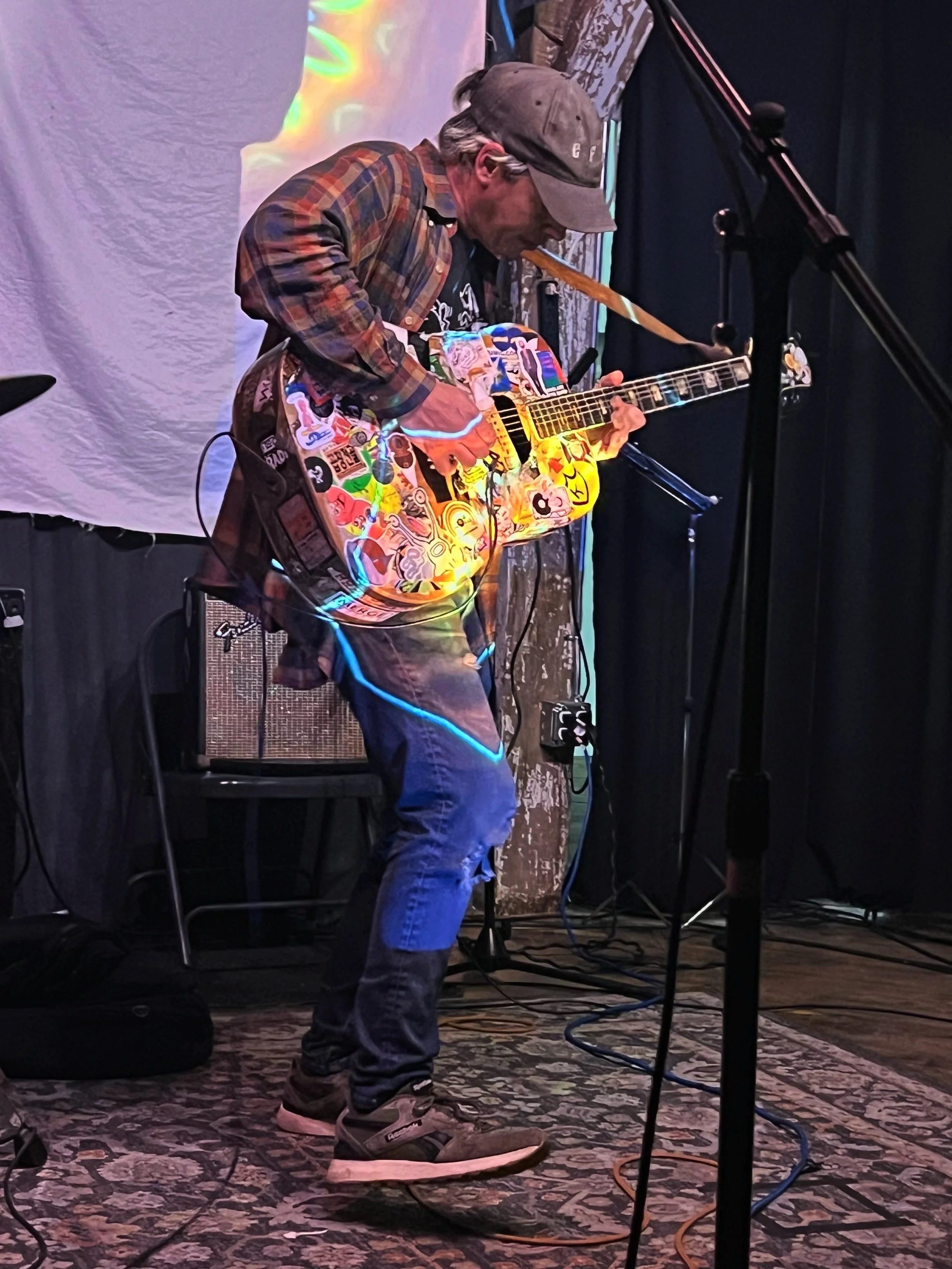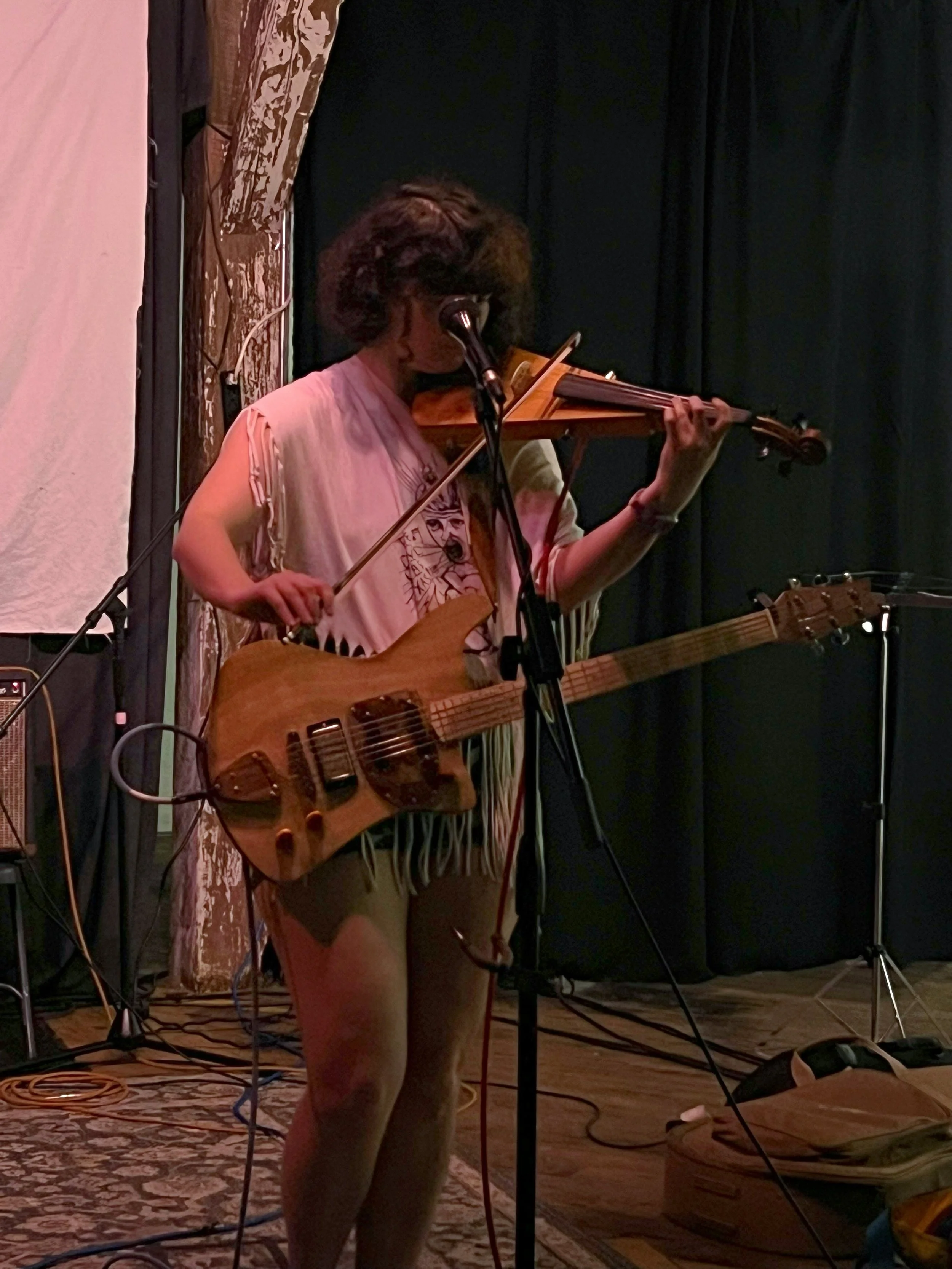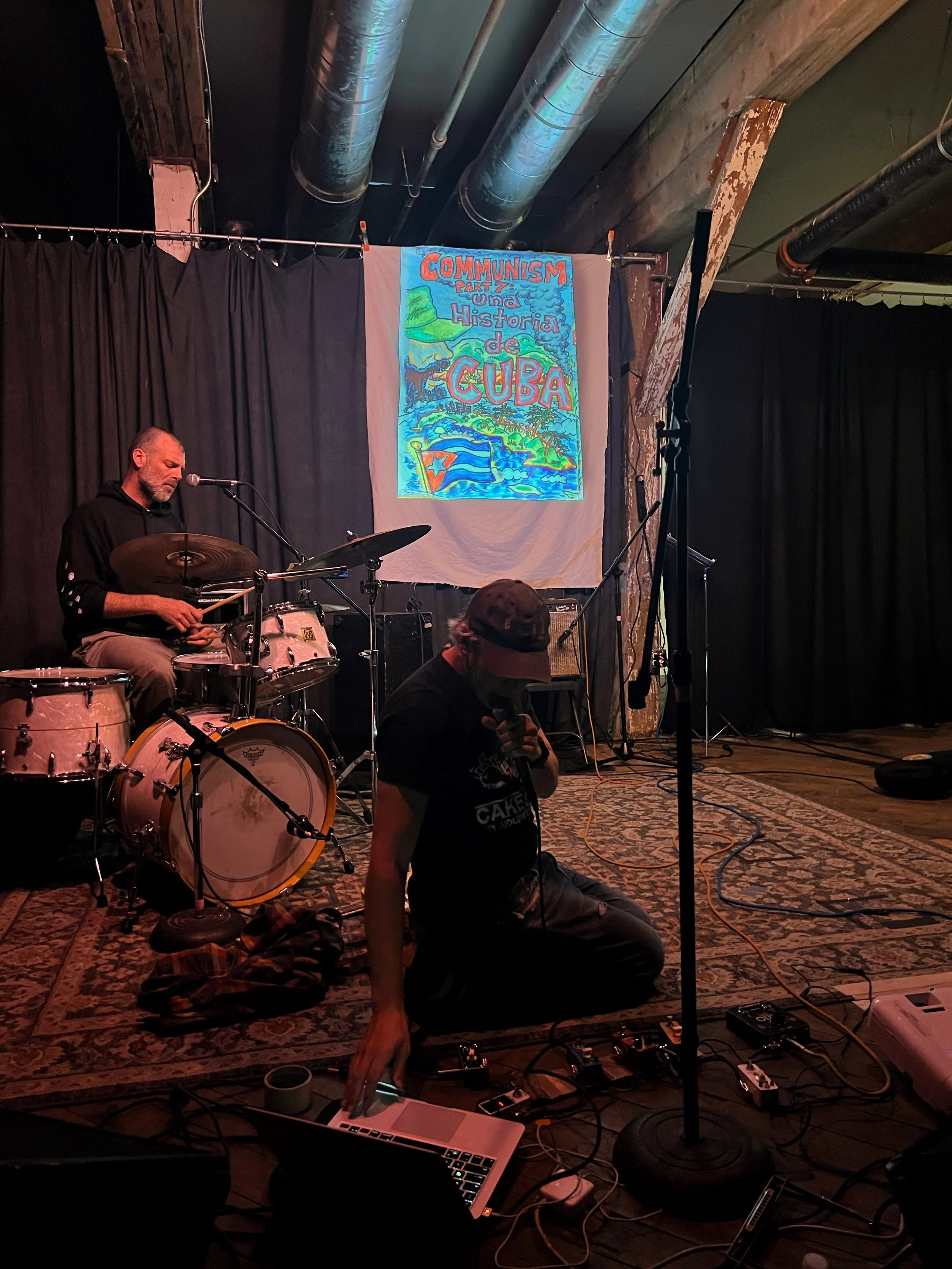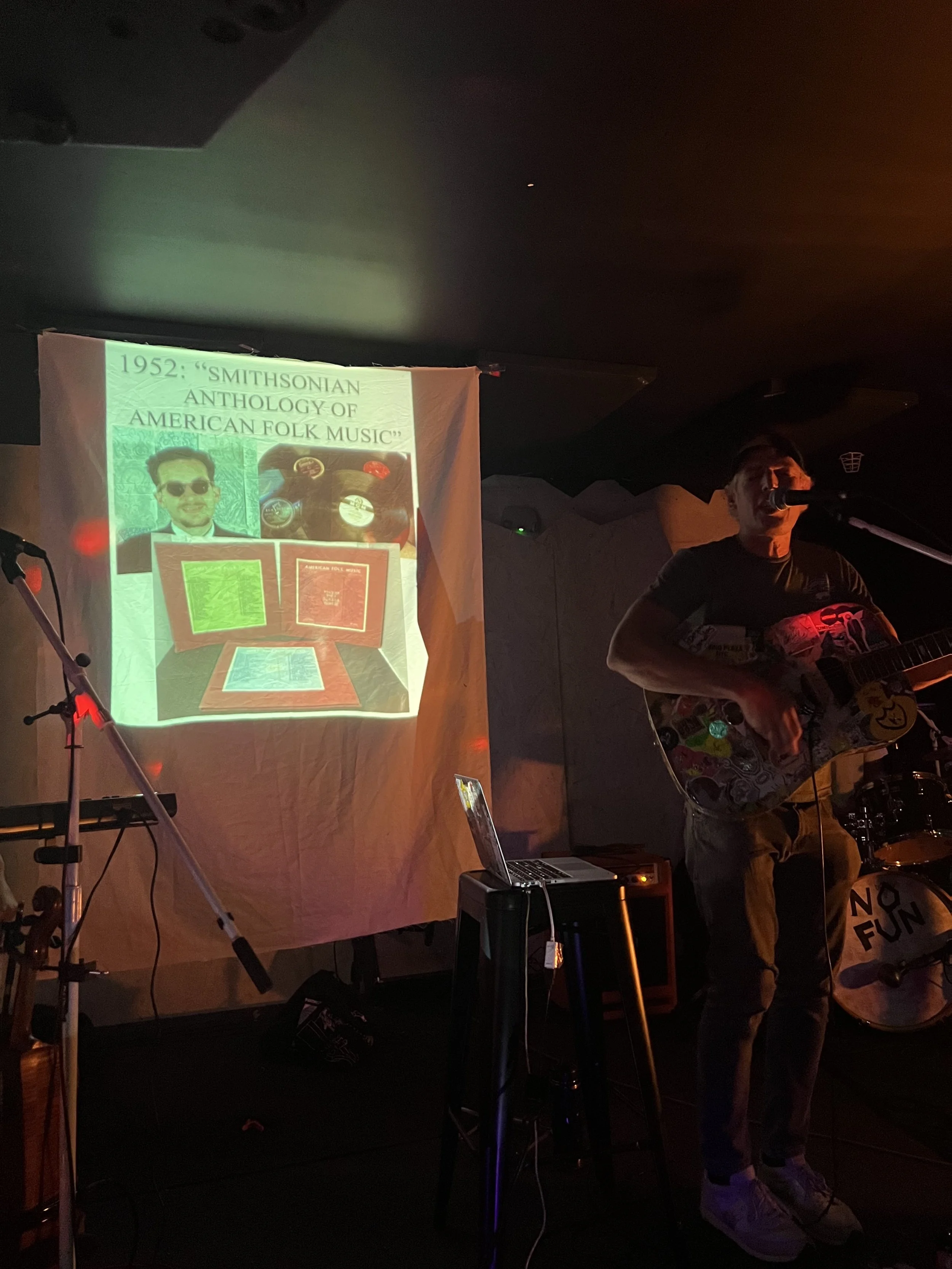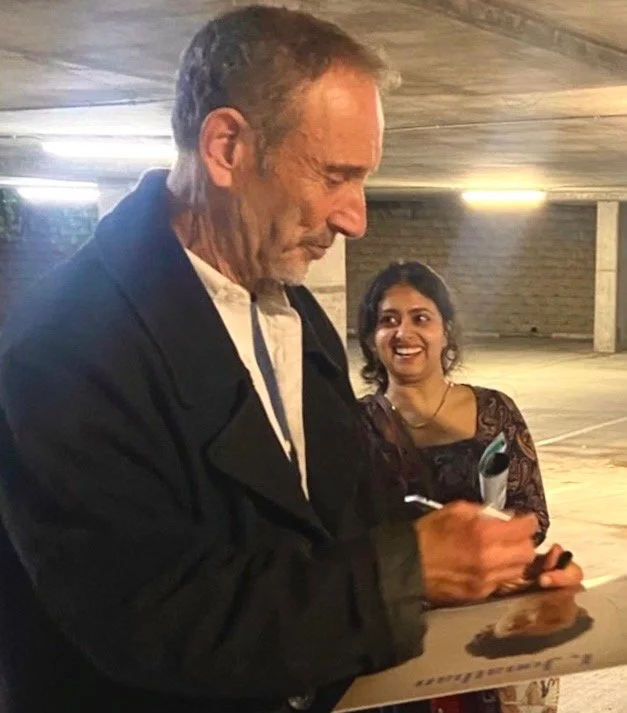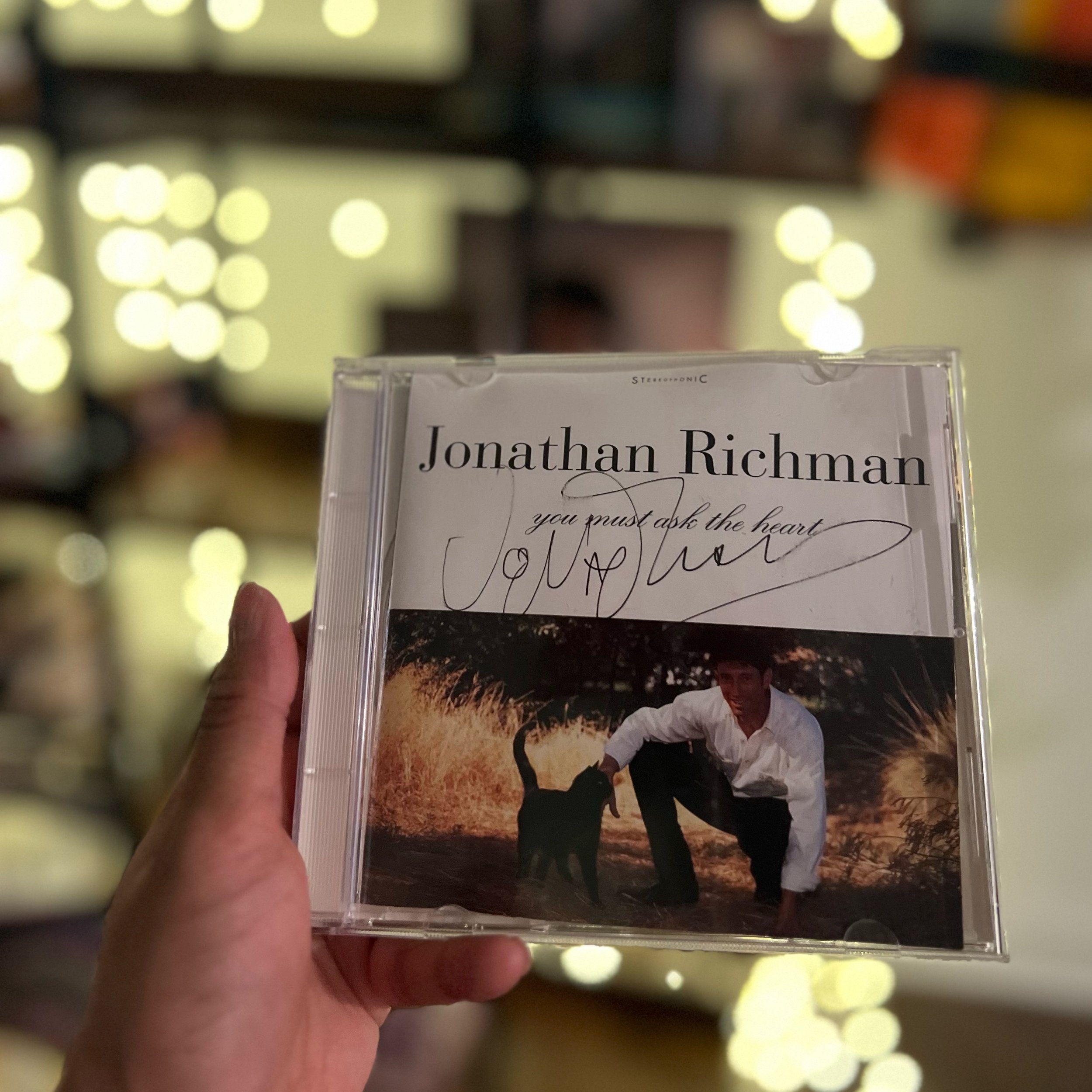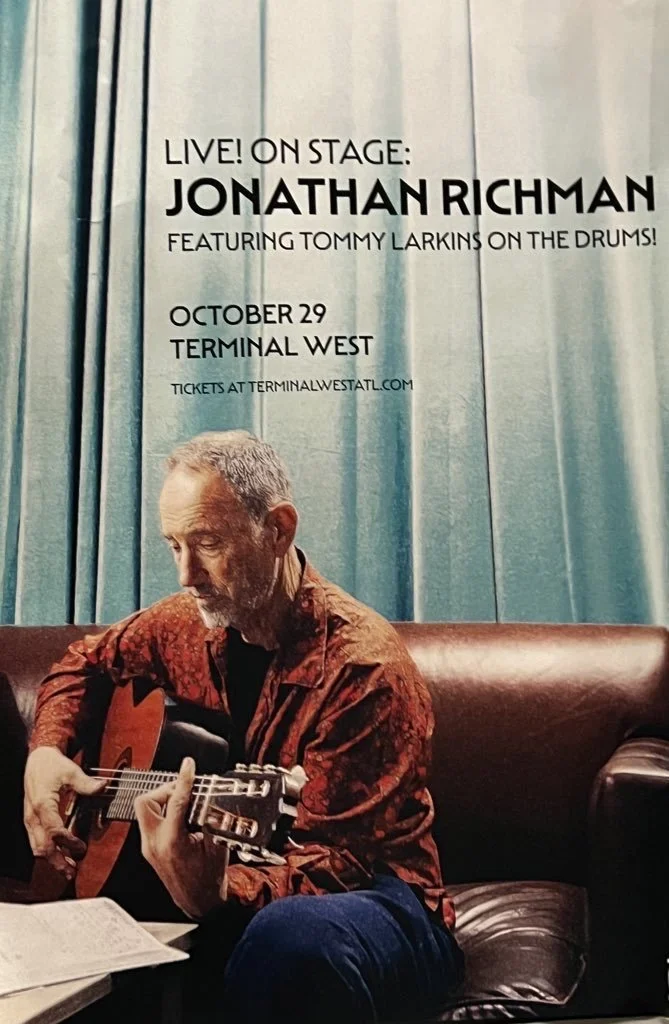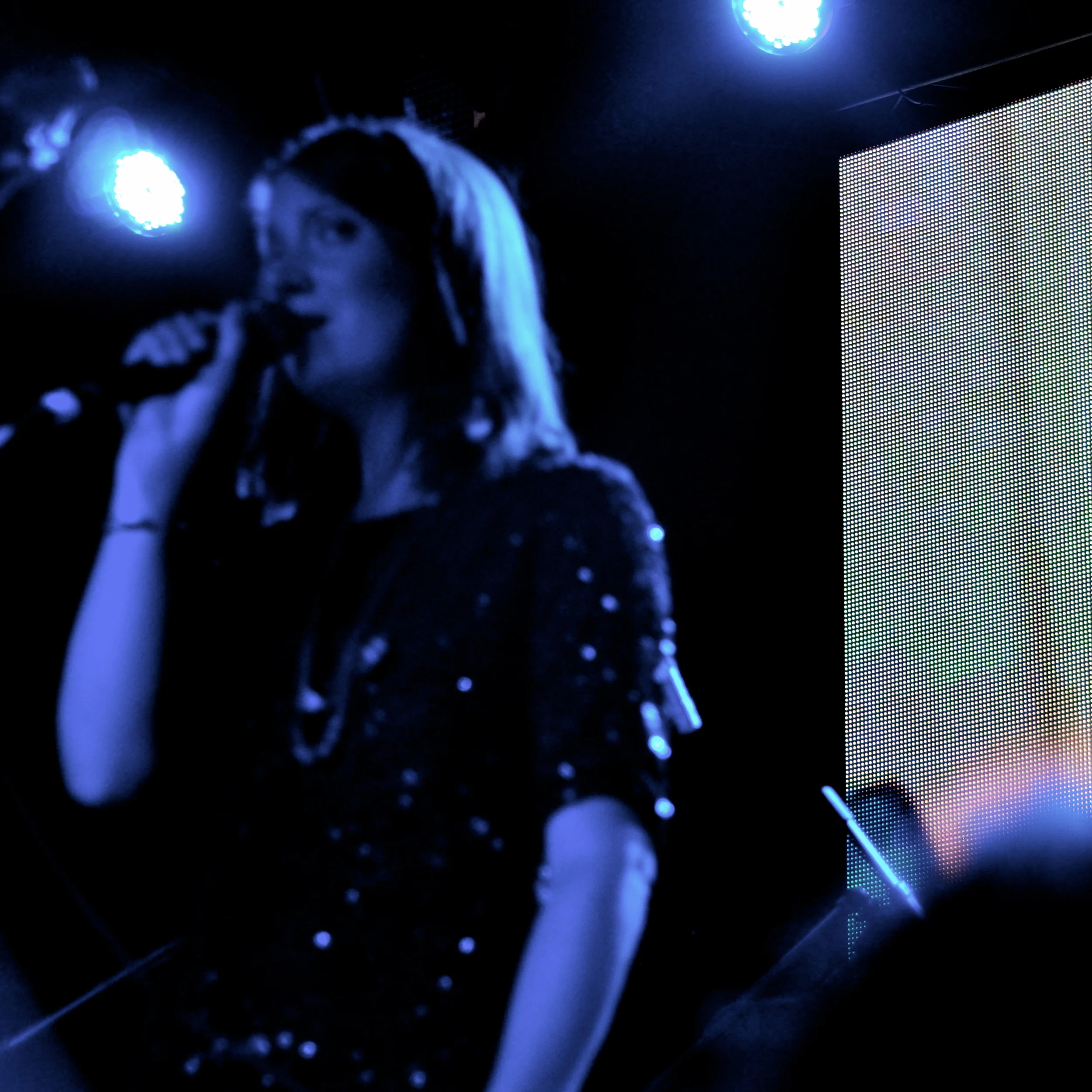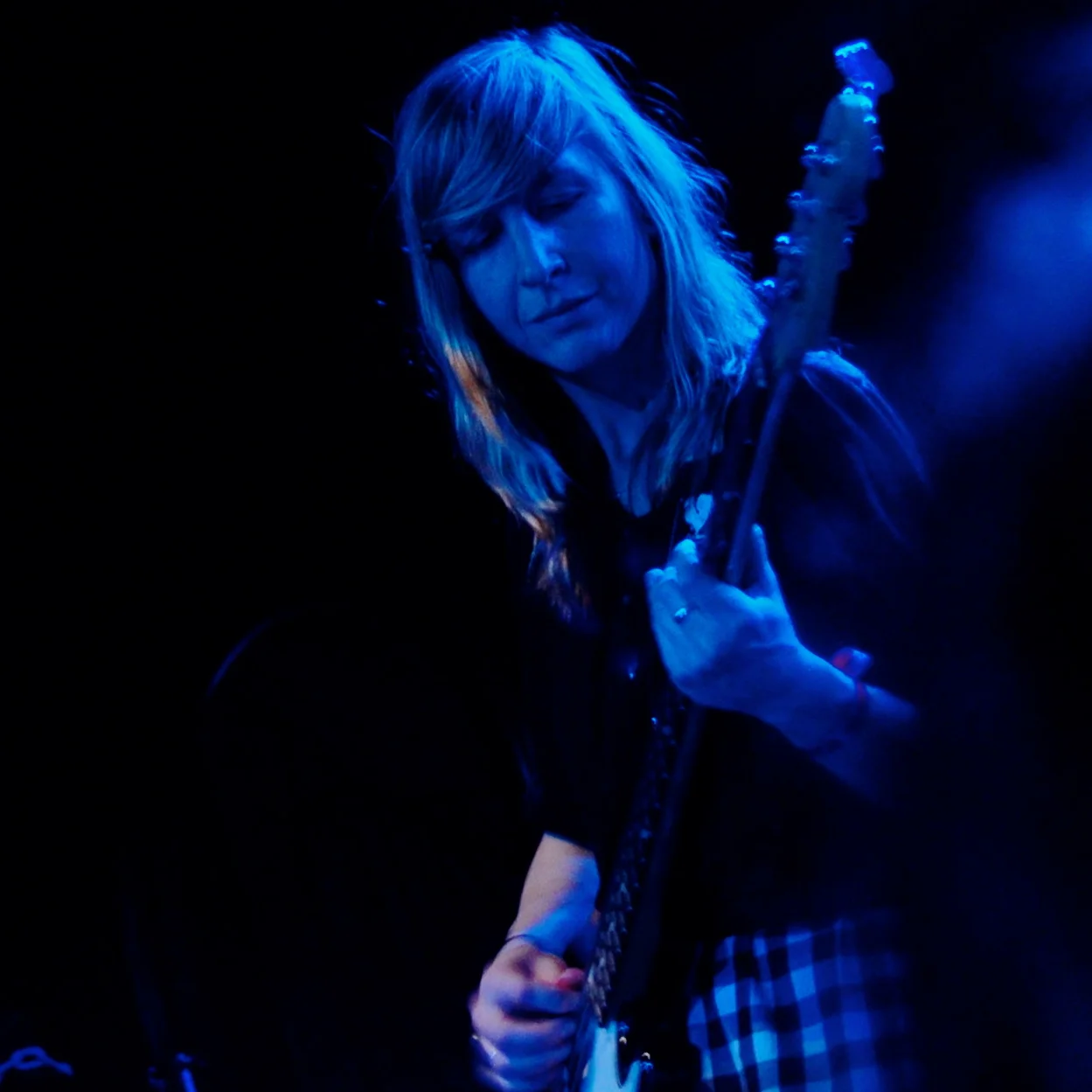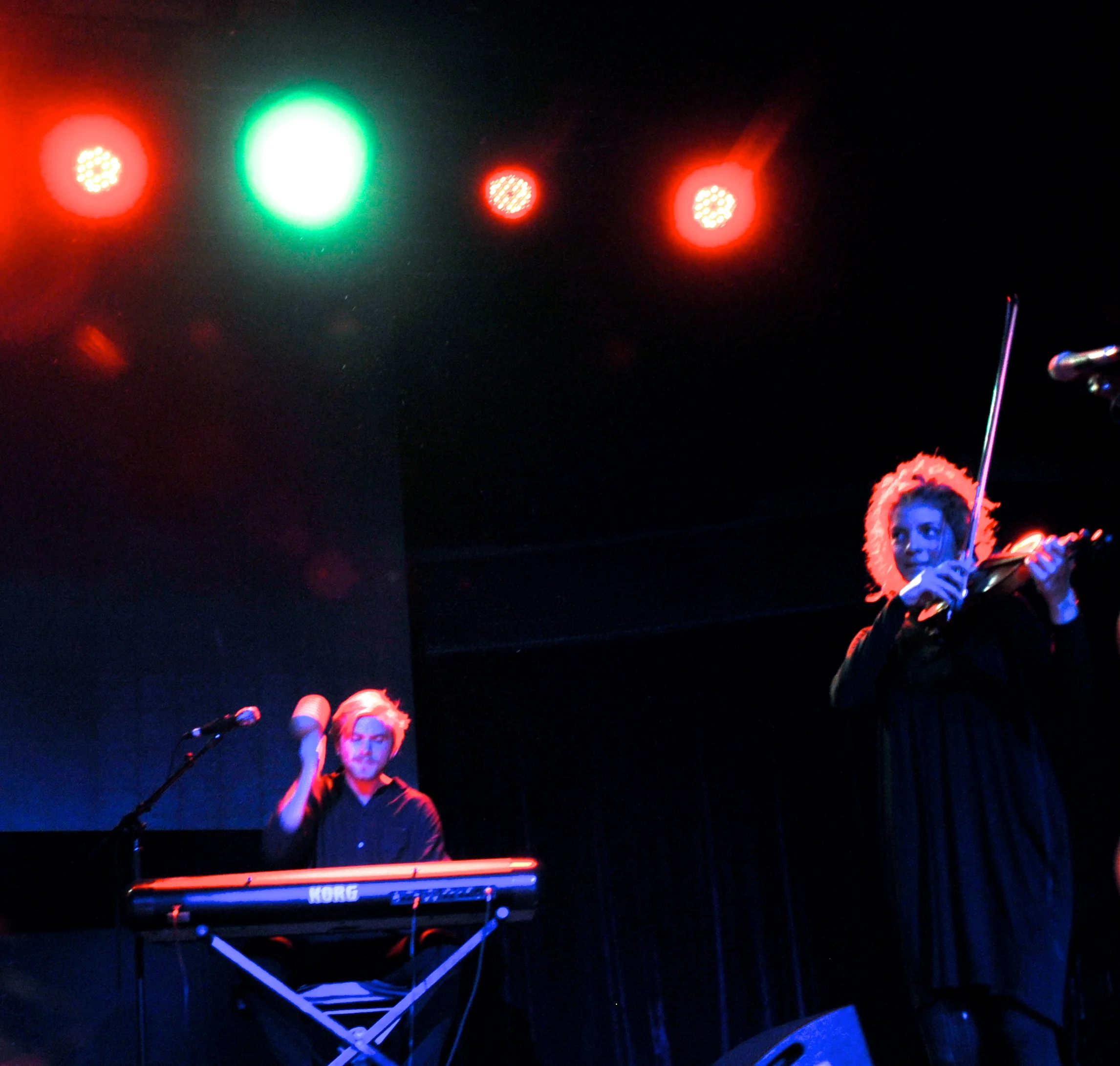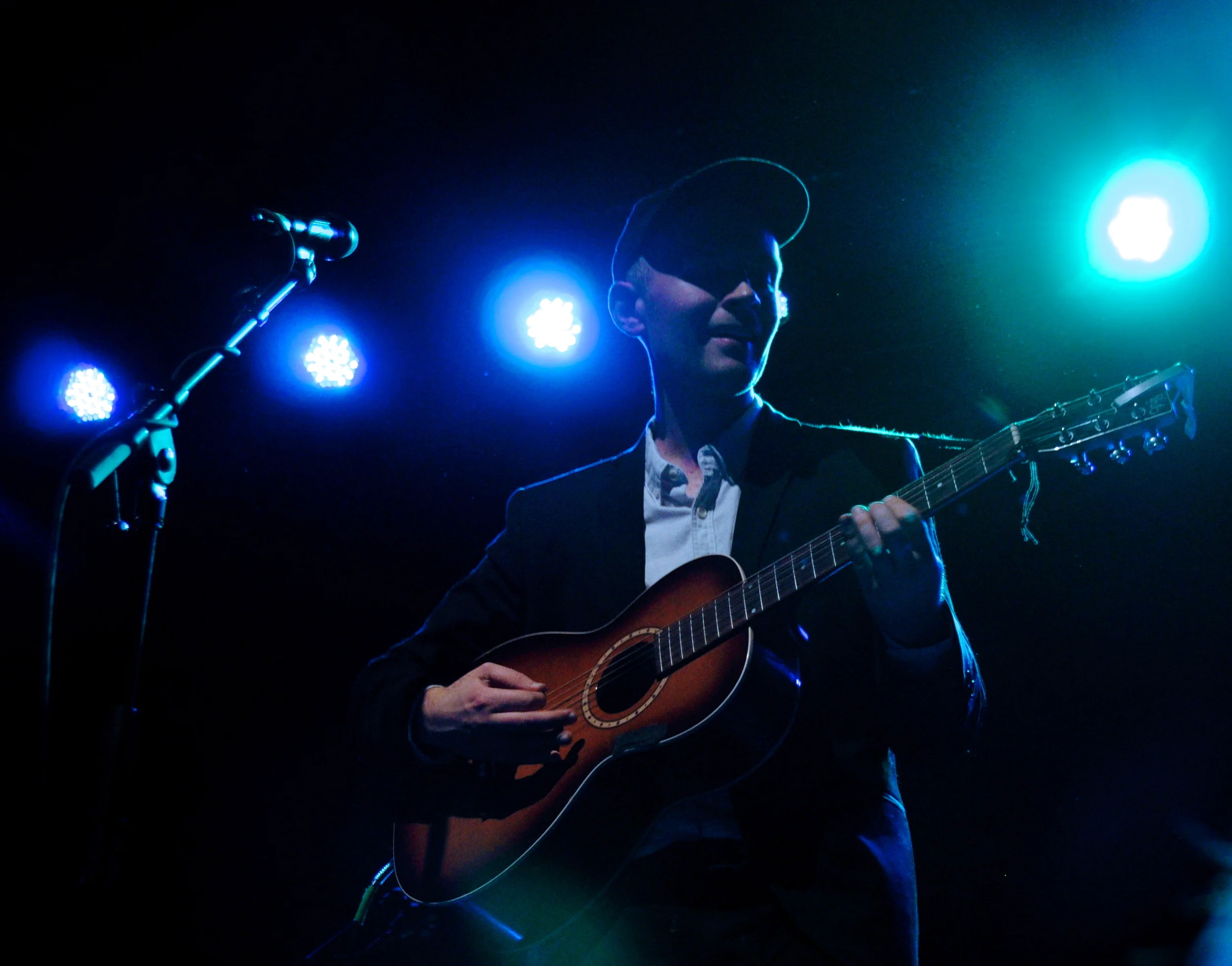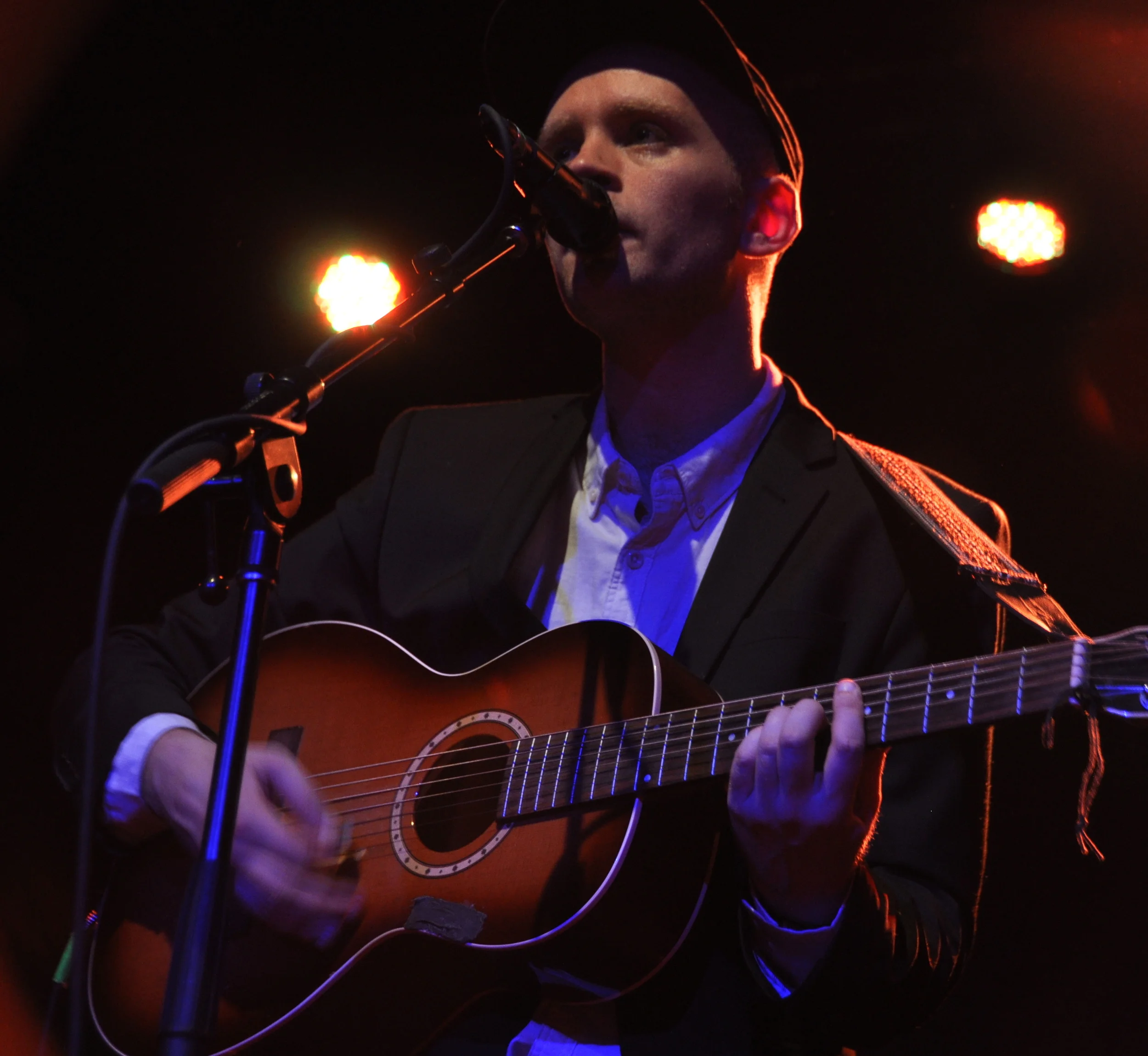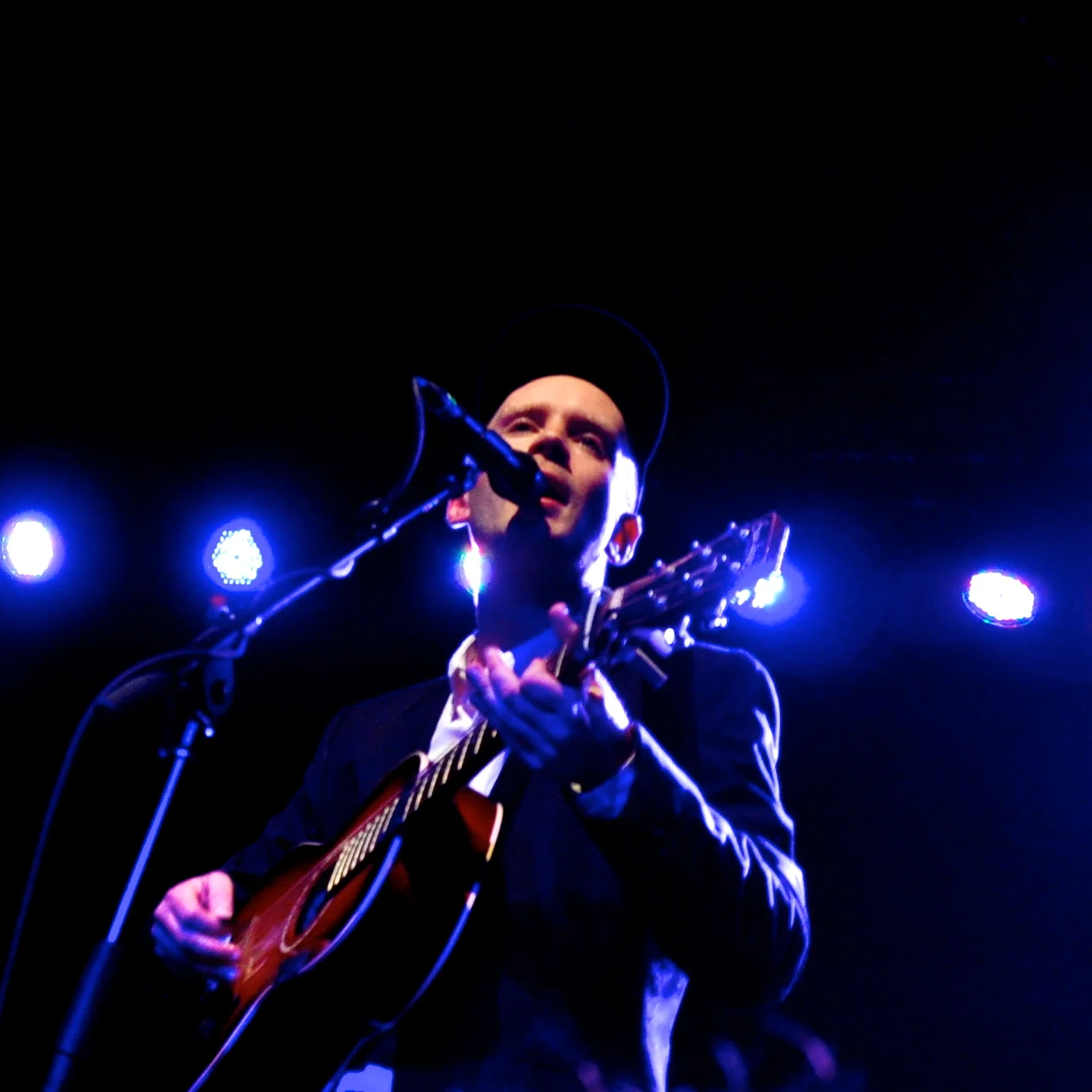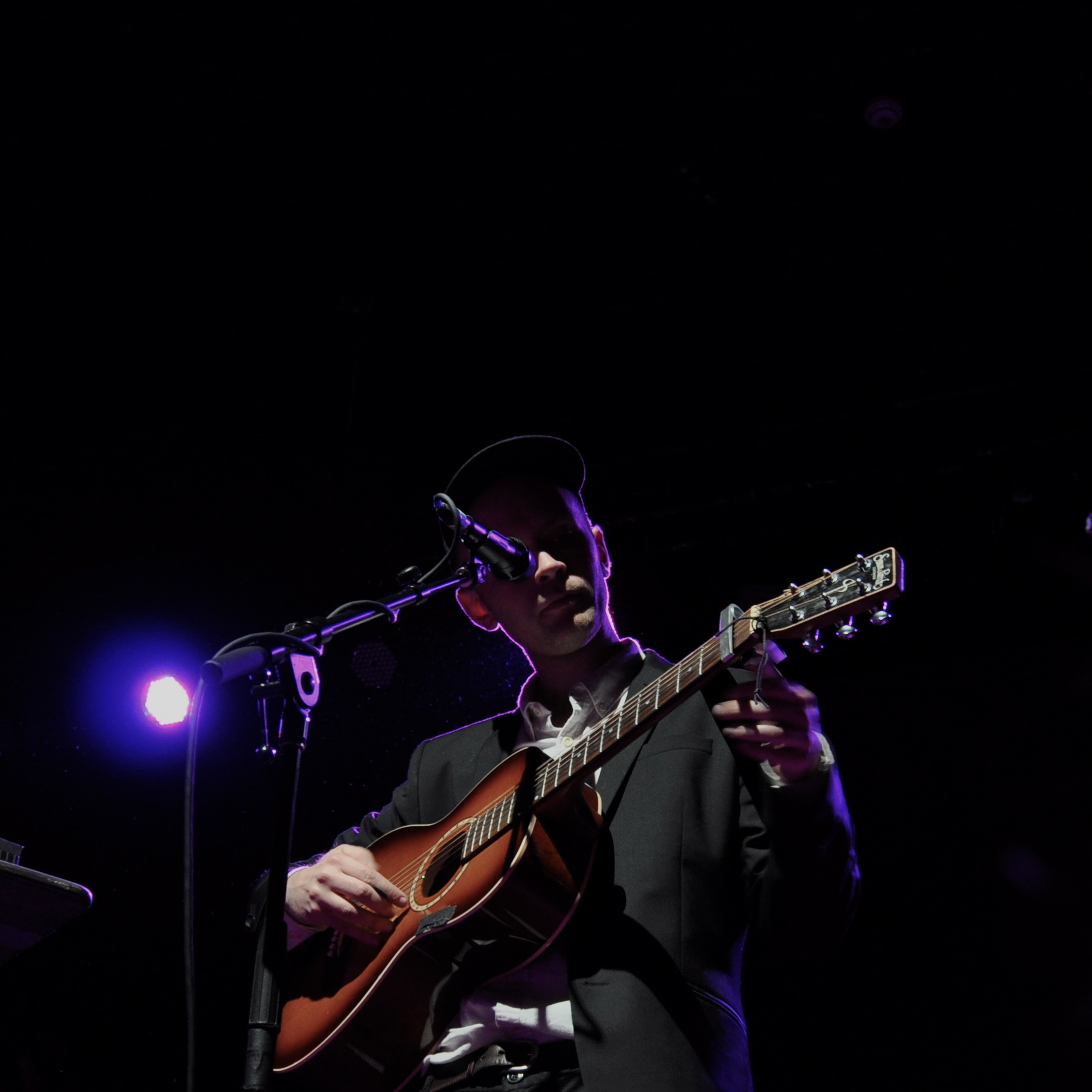CONCERT REVIEWS
Jeffrey Lewis and the Voltage
w/ The Grasping Straws & Nerdkween @ Eyedrum
Jeffrey Lewis is a songwriter’s songwriter.
The New York City folk punk musician and comic book artist has been darning the fabric of urban life, love, and cosmic absurdity since 1997. His storytelling has been lauded by greats on both sides of the pond and across the Continent. The late indie rock poet laureate David Berman called Lewis “the best pure songwriter I know of.”
Lewis’s songs entered my life fifteen years ago. A friend pressed “Williamsburg Will Oldham Horror” into my eager hands on a CD mixtape. I was instantly swept up in a whirlwind train ride featuring indie rock royalty, imposter syndrome, and the memetic nature of art.
Jeffrey Lewis performing at eyedrum.
The charm of Lewis’s art is how it never fades into the background. It demands your full attention with both the lyrics and accompanying visual media. There’s no lack of interviews, house tours, or released and upcoming documentaries about the artist. But the magic of seeing Lewis live is what draws fans to gather whenever he’s in town. Which is why concert goers braved Atlanta traffic, helped each other find parking, and squeezed into the intimate performance space of the eyedrum art gallery.
The band wrapped up their dinners and spoke highly of the BBQ place around the corner. I purchased a Topo Chico but mostly drank in the conversation with other attendees. I felt an immediate kinship with people at this show. Many of us had recently attended the same concerts, like Jenny Lewis, The Mountain Goats, or Kurt Vile. We’d exchanged smiles, but couldn’t introduce ourselves in the rush of the crowd. We took advantage of the atmosphere of eyedrum to talk about the Atlanta indie scene and experiencing art beyond consumption.
And then the lights dimmed.
Our first performance of the night was a solo set by local Atlanta artist, Monica Arrington, aka Nerdkween. She wove together classical vocals and postmodern music to create airy sounds with technical precision. Her performance was a hypnotic oscillation between guitars, radios, and tape machines. Her voice and lyrics, too, cast a spell, inviting us to “conjure.” The track “The Dark Horse” was a particular standout: “‘So who do you know?’ “I don’t have the right friends to be well known. That is my testament’”
I received a copy of her 2008 album, Synergy and loaded it on my CD player as soon as I got home. Some great tracks: “3 Haiku,” “Icon,” and “If.”
Our second performance was by The Grasping Straws. Frontwoman Mallory Feuer lulled us in with a gentle tune before making us reach for ear plugs. She unloaded incisive commentary on technology and the machinery of distraction. Her fondness of psychedelic repetition was as meditative as her commentary was keen. At various points, Feuer played strings and read poetry. In “Home” she sang that her “memories are fading away” but I won’t be forgetting The Grasping Staw’s performance anytime soon. Check out the 2023 album Patterns.
The crowed was packed by the time Jeffrey Lewis and The Voltage took the stage. (The stage was in fact a faded oriental rug under the low ceiling of eyedrum, bolstered by walls of modernist erotic paintings). It started light and seasonally apt. Lewis strummed his sticker-spackled guitar into an ode to springtime: “There's a bird on the ground, dog on the roof. Chirp, chirp, woof, woof.”
He quickly moved onto the more dire dilemmas of life: plans with parents, potential crushes, and the embers of creative inspiration growing fainter - all while having “Just Fun.”
It’s not a Jeffrey Lewis show without his signature visual presentation of strange tales and thoroughly researched history. The lyrics don’t simply mirror his comics. They run from panel to panel, chasing an adventure. In this show, he performed:
“The Red Hand,” which featured a severed hand “as red as the devils,” a school bus full of nuns, and a monster who offers Lewis a pretty sweet gig.
“The History of Communism in Cuba,” a part of his “History of Communism” series. Lewis presented illustrations of the island nation’s history, from colonization to communism. Despite the upheavals and embargoes, Cuba emerged as beacon of hope in the global south. The nation still stands as proof that western imperialism can be resisted. Check out his History special on the Cuban Missile Crisis.
“Creeping Brain,” in which the titular character crept across landscapes and cities, absorbing lifeforms, and gaining powers of destruction with each incantation of its name.
We heard some fan favorites, as well:
The tender “Chelsea Hotel Oral Sex song,” where a serendipitous conversation about Leonard Cohen on 23rd street haunts Lewis to this day.
“Seattle,” which explored transportation logistics for getting the loot from PNW used record stores back to New York without a car. I had cited it for years while protesting the need to get a driver’s license.
“LPs” a cautionary tale of lingering long enough in record stores to catch a disease.
By this time, the crowd had convulsed into dance reminiscent of the shakes Lewis experienced when passing by used music retailers. Though these days, Lewis walks past the LPs and heads towards the much cheaper CDs: “Whatever people don't want that the time to get it. Take a chance on something it might blow your mind.”
Lewis paused to say that folks often ask him for writing advice. He stresses the importance of consistency: Write ten and keep one. Toss the rest. Although, he tries to play a couple of songs from the wastebasket in every show. I tried to remember this each time I sat down to write (and rewrite) this piece. Between the scribbles in my steno pad, long pauses in my voice memos, and half sentences in my notes app - I found a lot of gold in the trash.
The night ended on a very topical note. In “One State Secular Solution,” Lewis his dream for a world liberated from the reigns of demagogues and oligarchs. He’s ready to join a cause - if only someone has a plan he could protest for.
After the show, I spoke to Jeffery Lewis about seeing him perform “The History of The Development of Punk on the Lower East Side, NYC” in Troy, New York. I had recently rediscovered The Smithsonian Anthology of American Folk Music, which led me back to my music and literary criticism roots. Lewis’s reference to it on his 2022 tour urged me to keep my writing momentum going. And I packed it all with me to take to Atlanta.
A lot has been written about instant gratification and the attention economy. The performances by Nerdkween, The Grasping Straws, and Jeffrey Lewis and the Voltage were a much needed respite from the noise.
These musicians’ blend of storytelling and visual art fit right at home at eyedrum, a space that dares us to imagine art beyond passive consumption. Check out upcoming Atlanta events that celebrate the depth and elation of creative expression.
The recently released 2023 Tapes (bandcamp link) has been pulling me out from the technological dopamine rut. It features “17 songs recorded and mixed on April 24, 2024 and additional home recordings” with that wit, vulnerability and keen observation you know and love:
The standouts:
Things That People Give Me
Dating Profile
We Fight When We Text
Bonus content from Upstate NY (Troy, Saratoga Springs) and in DC (the Smithsonian Institute) en route to Atlanta.
Jonathan Richman and Tommy Larkins
at Terminal West “Where we Dreamed OuR Dreams”
Walking into Terminal West, I was instantly reminded there’s no such thing as a casual Jonathan Richman fan.
This was my 6th time seeing Jonathan Richman perform with Tommy Larkins. Whether it was Somerville, Cambridge, DC (twice) or Baltimore, I made time when the duo came to town. My last time seeing Jonathan and Tommy was in February 2020, supported by Bonny “Prince” Billy. What a show to experience just before the world shut down.
I spoke to other ardent JoJo fans in the crowd, including some who’d been attending his shows since the early 70s. Another fan mentioned he asked for tickets for his 21st birthday. Many of us could barely eat leading up to the event - hungry for multigenre, multilingual course of humor, sincerity, and dance moves we were to be served.
Conan O’Brien once exclaimed to his good friend, “Jonathan, I never know when you’re telling a story or singing a song.” And that’s exactly what we were all here for.
The evening crescendoed with "O Moon, Queen of Night on Earth," a serenade under the October hunter's moon. The lyrics wove a spell, and Jonathan's earnest eyes matched the moonlight's soft glow. "O Sun" followed, urging the celestial body to rage on in its fury, invoking the indigenous Ojibwe word for fire: “Ishkode! Ishkode!”
Much like his hero Vincent van Gogh, JoJo “love[s] color and he let it show” by engulfing us into the synesthetic realm. His guitar manifested in orange hues, and Tommy’s drums reverberated in shades of purple.
In hits like “I Was Dancing In a Lesbian Bar” and the hypnotic instrumental “Egyptian Reggae,” the guitar transformed into Jonathan’s dance partner, swirling notes as swiftly as Jonathan swerved his hips.
While Pablo Picasso never got called an asshole, according to the Modern Lovers hit, he did get called out by Jonathan at tonight’s: “I read his memoir. So predatory, so passé, so 1940s.” He frowned deeply. The "elegance" and "discipline" of the Old World he previously exalted had lost their shine. “I don’t want to go back to the chauvinism, the fearfulness, love of torture, abuse of women.”
Jonathan also took time to caution against online scammers impersonating him, humorously adding, "They wouldn’t pretend to be Beyoncé! But I guess even scammers have to eat.”
The night humorously and gracefully concluded with an ode to "Cold pizza – food of the gods!" Best paired with flat soda, equally at place after a party or at the Parthenon. It was barely 9 pm, but we all had to accept that “it is what it is what it is what it is.”
However, an encore of energy unfolded as Jonathan engaged in post-show conversations with fans:
As a New Englander, my ties with Jonathan transcends geographical boundaries. My affection for him mirrors the evolution of his compositions – "Twilight in Boston," "The Fenway," and "Better than Before" etching memories into reading benches, dumpling shops, and first kisses. A pocket warmer during Back Bay winter strolls and a whisper of summer through brownstone windows, Jonathan almost persuaded me to "put down that cigarette and drop out of BU."
We spoke earnestly about the past. How we weren’t “the same lover[s] from the days of Fenway and Kenmore,” and whether “the glory days were gone.” He was more excited to talk about the magic of the now and how he cheers on youth demanding back power from institutions. We left agreeing that “now is better than before.”
Jonathan's waved goodbye, "I'm not too good with names, but I remember faces.”
Well, Jonathan. You’ll certainly be seeing my face around at an upcoming show.
From “Dreams of Boston” to Boston Calling: VAmpire Weekend
By the time 9 o’clock rolled around on Saturday night, there was no sign of the beach blankets that had dotted City Hall Plaza for most of the afternoon. This time, Boston Calling festival-goers all crowded around the Blue Stage, standing on the tips of their toes for Vampire Weekend.
The band stepped onto the stage and into a deafening wave of screams from crowd. The artfully disheveled lead vocalist Ezra Koenig seemed quite at ease in this adulation – and for good reason. The band was fresh out of the recording studio with a third album on the shelf and continuing to push their trajectory of widespread appeal and critical acclaim to new heights.
But any and all pretentions were dropped as the band launched into the lead single from Modern Vampires of the City, “Diane Young.” Channeling the high energy and wry irony from his college band days at Columbia, Koenig peppered sly bridges of “baby, baby, baby, baby,” while bemoaning how “it’s bad enough just getting old.”
With that, he continued to revisit his youth with fan favorites from previous albums, such as “Cape Cod Kwassa Kwassa,” “Holiday,” and “Cousins.” The concertgoers sang along to the quirky, Afropop-infused hits, name-dropping Benetton and Peter Gabriel and exploring themes of post-colonialism and feudal Japan along the way.
The band even brought out a rare B-side gem from their first EP, “Ladies of Cambridge.” For the first time that night, the crowd stood still as Koenig confessed: “I’ve had dreams of Boston all of my life/Chinatown between the sound of the night/But if you leave I just don’t think I could take it…”
Soon enough, it was time for the last song. The band bid everyone goodbye and dedicated a very appropriate song to the Boston crowd about leaving New England. Koenig couldn’t help smile through lines of “Walcott, don’t you know that it’s insane/Don’t you want to get out of Cape Cod, out of Cape Cod tonight?”
Somewhere between the allusions to Derek Walcott, Provincetown, and Hyannisport, Vampire Weekend convinced the crowd that even as the band leaves City Hall Plaza, their music has internalized the city of Boston at its very core.
The infinite storyteller: Jens Lekman at The Royale
After the last whispery note of Taken by Trees, Victoria Bergman’s airy voice disappeared into the darkness Saturday at Boston Royale, leaving the small, intimate crowd waiting patiently for headliner Jens Lekman.
Swedish singer-songwriter and storyteller extraordinaire Jens Lekman is never one for conventional arrivals. Instead, a pianist walked onto the stage and gently pressed into the keys the simple first notes of “Every Little Hair Knows Your Name,” which is the first and only instrumental track on Lekman’s new album I Know What Love Isn’t.
The crowd stood in silence for the entire two-minute song. This silence became a deafening roar as Lekman walked out of the shadows and took the stage to launch into the deceptively upbeat and sunny “Become Someone Else’s.”
The quintessences of Lekman’s performances are the stories that precede each song. Though his very well-produced studio albums have their own clean-cut appeal, it is evident that the full potential of a Jens Lekman song can only be realized alongside the talks that accompany his live performances.
Before launching into the title track of his latest album I Know What Love Isn’t he explained how he loves telling stories so much that he called off a sham marriage with his friend for the purpose of getting an Australian citizenship just so he could be free to talk about it without legal repercussions. It appears to be the mark of a born storyteller to decide on major life choices based on whether or not it should be kept a secret.
The brilliance of the talks on this particular night were how they neatly strung together the songs into a cohesive story and acted more like transitions than like random, forced chatter. For example, he introduced “The End of the World is Bigger than Love,” by dedicating it to “anyone who’s ever had their heart broken,” which garnered some slow, knowing nods from the crowd.
After advising listeners (and probably trying to assure himself) that a “broken heart is not the end of the world,” he dedicated the next song, “Some Dandruff on Your Shoulder” to anyone who’s ever had to break someone else’s heart. Nervous laughter ensued.
The songs took a turn for the slow and sorrowful soon afterwards, when Lekman specifically requested that only blue lights be left shining for “I Want a Pair of Cowboy Boots.” Aside from the occasional nod, no one moved. Perhaps they also needed cowboy boots.
Lekman, never willing to let the blues get to him, found a way to get the crowd riled up again. “Do you want to do some dancing?” he shouted into the microphone and led the crowd in claps escalating in speed and loudness into the danceable favorites like “Sipping on The Sweet Nectar” and “An Argument with Myself.” It’s songs like this that will ensure that Lekman never gets pigeonholed into the “sad-guy-playing-guitar” group.
Also unique was the level of interaction with the audience Lekman brought into the stage. During the first encore, the band played “A Postcard to Nina,” in which Lekman encouraged his friend to not “let anyone stand in your way.”
In the second encore, Lekman was back by himself, carrying only a guitar. He proceeded to strum and hum into the most fitting song of the night “Pocketful of Money.” The hypnotic, minimalist melody put the entire crowd in a trance. Soon enough, everyone was snapping their fingers and singing along to a minute-long chorus of “I’ll come running with a heart on fire.”
In the pause that followed when Lekman sighed into the microphone one final request to be taken somewhere “where the people are pleasant/Where the music never ends,” everyone looked around the small crowd. They instantly knew that they’d come to the right place.
Lekman bid the crowd goodnight with a “little lullaby” and brought us full circle to a lyrical rendition of the first instrumental, “Every Little Hair Knows Your Name.” With haunting verses like “Every cell in this body/Has been replaced since I last saw you/but the memory is in the DNA,” the last song ensured that this show won’t be forgotten soon. It will be internalized, revisited and cherished.
